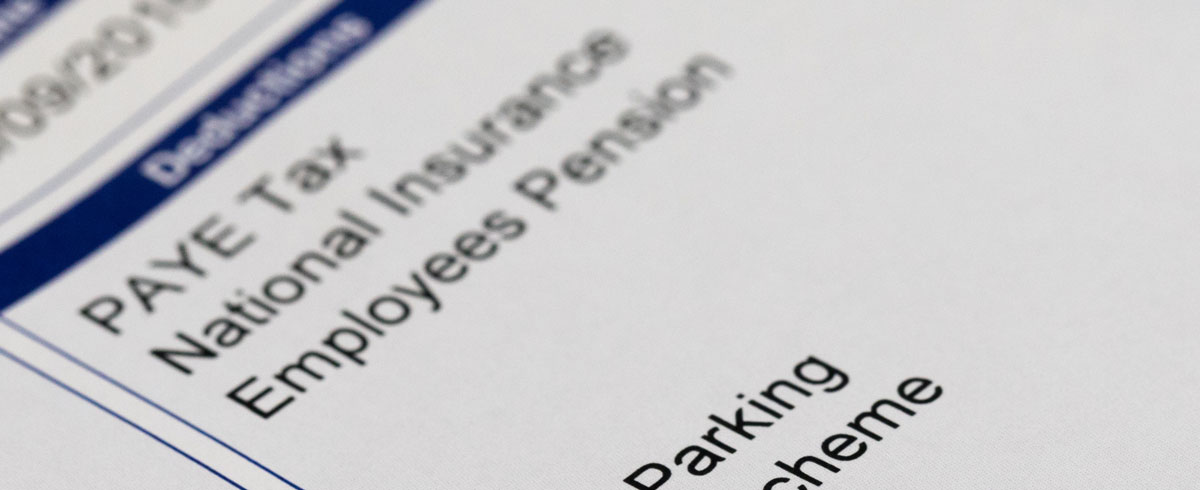
Understanding Your Payslip
Understanding Your Payslip – Confused by all those terms on your payslip? Our resident payroll experts break down everything you need to know.
HOW TO READ YOUR PAYSLIP
PPS Number: Your Personal Public Service (PPS) number is a unique identifier used by certain state bodies for tax purposes and when you need to access social welfare benefits and public services and information in Ireland.
PRSI Class: The PRSI Class is usually dictated by a person’s employment and will influence the amount of PRSI contributions you pay. There are 11 different classes, for more information click here.
Weekly/monthly cut off: The amount you can earn each time you’re paid before you have to pay the higher rate of tax. Every time you’re paid, you pay tax at the standard rate of tax up to your standard rate cut-off point.
PAYE: This stands for ‘Pay As You Earn’ and is a system of deducting income tax, PRSI and USC from your salary.
Tax Credit: Each individual is entitled to tax credits, based on their personal circumstances, e.g. if they’re married or in a civil partnership or are an employee (PAYE) or have certain tax credits, etc. Tax credits are allocated each year and tax is calculated as a percentage of your income. Your tax credits are deducted from this to give the amount of tax you’ll pay. Any unused credits are forwarded to your next pay period(s), so a tax credit will reduce your tax by the amount of the credit.
PRSI: PRSI is ‘Pay Related Social Insurance’ contributions which go towards Social Welfare benefits and pensions. Most people working in Ireland have to pay this with few exceptions. The amount you pay depends on your job, earnings, and what PRSI class you’re in. In some cases, you may be entitled to a rebate.
USC: The ‘Universal Social Charge’, is a tax that has replaced the income levy and health levy. You’ll pay this if your gross income is more than €13,000 per year.
Gross Pay: The total amount you’re paid before any deductions are made.
Net Pay: The total amount each time you’re paid after tax, PRSI, and other deductions.
Total Deds: The total amount of money deducted in that pay period.
Your Payslip explained
Your employer applies PAYE tax based on information from Revenue on your employee tax credit certificate. However, Revenue might not have the most up-to-date information on your personal status (marital status or dependants etc) which could result in the incorrect allocation of bands and credits. This means you may end up paying more tax than you need to.
If this is the case, you should make a claim at the end of the year as Revenue won’t know you’re entitled to additional relief if you don’t inform them of a change in your circumstances.
Year-end Underpayments
This can happen if you’ve been allocated tax credits you are not entitled to. Revenue will usually seek reimbursement over the course of the following year by making an adjustment to your tax credits.
What does that mean for you?
This means your take-home pay will be reduced until the underpayment is settled. Sometimes underpayments go unnoticed by Revenue for a number of years and the taxpayer is then faced with a much bigger underpayment.
What can you do?
When you get your next payslip, see what it says for your monthly / weekly tax credit and cut off point. Multiply this by 12 or 52 to determine your annual tax credit and cut-off point.
The most common cut-off points for 2023 are as follows:
- Single / Widowed Person or Surviving Civil Partner without qualifying children – €40,000
- Person qualifying for the Single Person Child Carer Tax Credit – €44,000
- Married Couple or Civil Partnership – One Income – €49,000
- Married Couple or Civil Partnership – Two Income – €49,000 & €31,000*
*The rate band is capped at the lower of €31,000 or the income of the lower earner. This increase cannot be transferred between spouses or civil partners.
The most common Credits include:
Single/widowed Person or Surviving Civil Partner Tax Credit – €1,775
Married Couple or Civil Partnership Tax Credit – €3,550
Widowed Person or Surviving Civil Partner in year of bereavement – €3,300
Widowed Person or Surviving Civil Partner with dependent child(ren) – €1,650
Widowed Person or Surviving Civil Partner without dependent child(ren) – €2,240
Additional relief for subsequent years after year of bereavement
With a Qualifying Child:
Widowed Parent bereaved in 2022 – €3,600
Widowed Parent bereaved in 2021 – €3,150
Widowed Parent bereaved in 2020 – €2,700
Widowed Parent bereaved in 2019 – €2,250
Widowed Parent bereaved in 2018
Single Person Child Carer Tax Credit – €1,650
PAYE Tax Credit – €1,775
Home Carer Tax Credit – €1,700
Employed Person taking care of an incapacitated individual (max.) – €75,000
Age Tax Credit – Single/widowed Person or Surviving Civil Partner – €245
Age Tax Credit – Married Couple or Civil Partnership – €490
Incapacitated Child Tax Credit – €3,300
Dependent Relative Tax Credit – €245
Dependent Relative Income Limit – €16,156
Earned Income Tax Credit – €1,775
Interest – first-time buyers (allowable for first 7 years) single (max.) – €5,000
Interest – first-time buyers (allowable for first 7 years) married or in a civil partnership) – €15,000
Interest – first-time buyers (allowable for first 7 years) widowed person or surviving civil partner – €10,000
Interest – non-first-time buyers single person (max.) – €1,500
Interest – non-first-time buyers married or in a civil partnership – €3,000
Interest – non-first-time-buyers widowed person or surviving civil partner – €3,000
If your tax credits are higher or lower than what they should be, request a copy of your tax credit certificate from Revenue and this should spell out any adjustments that should be made. If you’re receiving items you’re not entitled to, contact Revenue to have this amended to avoid having a liability.
Paycheck Plus, Your Irish Payroll Processing Team
If you would like to speak to one of our resident payroll experts about bringing digital payslips to your organisation simply request a callback or call our Irish Payroll Providers on +353 (0) 1 905 9400
Our highly experienced payroll processing experts can help you to streamline your payroll processing and employee rewards. While our next-generation payroll software lets you consolidate your payroll processes into one simple and efficient workflow.
